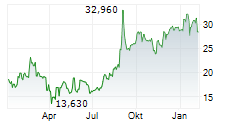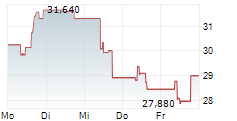Stockholm, May 22, 2025 - BioArctic AB (publ) (Nasdaq Stockholm: BIOA B) announced today that The European Medicines Agency (EMA) Committee for Orphan Medicinal Products (COMP) recommends granting orphan medicinal product designation to exidavnemab for the treatment of Multiple System Atrophy (MSA), providing incentives for the development of treatments for rare diseases with a high medical need.
MSA is a rapidly progressive and fatal rare disease affecting the central and autonomic nervous systems. MSA is characterized by pathological alpha-synuclein aggregation, that causes gradual damage to nerve cells in the brain. This affects balance, movement and the autonomic nervous system, which controls several basic functions, such as breathing, digestion and bladder control. Currently there is no cure and no available treatment to slow its progression.
Exidavnemab is being developed as a novel disease-modifying treatment for neuronal synuclein diseases such as MSA and Parkinson's disease. Exidavnemab is a monoclonal antibody (mAb) that selectively targets alpha-synuclein aggregates, such as oligomers, protofibrils as well as fibrillar forms. By promoting the clearance of aggregated alpha-synuclein, exidavnemab may reduce the spreading and the negative effects of alpha-synuclein. Thereby cellular function and survival may be preserved, and disease progression ultimately slowed down.
"This positive opinion recommending orphan medicinal product designation for exidavnemab in MSA in the EU and the corresponding orphan drug designation in the US, along with the approval to include MSA patients in our ongoing phase 2 study EXIST in Parkinson's disease, is fully in line with our ambition to support and develop treatments for a broader scope of neurodegenerative disorders," says Gunilla Osswald, CEO at BioArctic.
An EU orphan medicinal product designation offers a range of incentives to encourage the development of designated orphan medicines. Sponsors who obtain orphan designation benefit from protocol assistance, a type of scientific advice specific for designated orphan medicines, market exclusivity once the medicine is on the market and certain procedural fee reductions.
---
This release discusses investigational uses of an agent in development and is not intended to convey conclusions about efficacy or safety. There is no guarantee that such investigational agents will successfully complete clinical development or gain health authority approval.
This information is information that BioArctic AB (publ) is obliged to disclose pursuant to the EU Market Abuse Regulation. The information was released for public disclosure, through the agency of the contact person below, on May 22, 2025, at 15:15 CET.
For further information, please contact:
Charlotte af Klercker, Senior Director Sustainability and Communications
Phone: +46 73 515 09 70
E-mail: charlotte.afklercker@bioarctic.com
Anders Martin-Löf, CFO
Phone: +46 70 683 79 77
E-mail: anders.martin-lof@bioarctic.com
About MSA
Multiple System Atrophy (MSA) is a rapidly progressive and fatal rare disease affecting the central and autonomic nervous systems. MSA is a synucleinopathy, a group of neurodegenerative diseases characterized by an abnormal alpha-synuclein aggregation, that causes gradual damage to nerve cells in the brain. This affects balance, movement and the autonomic nervous system, which controls several basic functions, such as breathing, digestion and bladder control. Currently there is no cure and no available treatment to slow its progression.
MSA is a condition with very high unmet medical need and poor prognosis. Currently, no cure or treatment is available to slow the progression of the disease. Patients typically live about 6 to 10 years after MSA symptoms first appear, with few patients surviving more than 15 years[1],[2]. MSA is significantly debilitating and classified as a rare disease, affecting less than 42,000 persons in the U.S.
About Exidavnemab
Exidavnemab is a monoclonal antibody drug candidate that is designed to selectively bind and eliminate aggregated forms of alpha-synuclein such as oligomers and protofibrils, as well as fibrillar forms, which participates in neurodegenerative disorders including Parkinson's disease and Multiple System Atrophy (MSA). The goal is to develop a disease modifying treatment that stops or slow down the progression of alpha-synucleinopathies e.g. Parkinson's disease and MSA. BioArctic's phase 2a study EXIST with exidavnemab is ongoing since 2024. EXIST is an important step towards a proof-of-concept study focusing on the efficacy of the drug candidate.
Exidavnemab has been granted orphan drug designation (ODD) in the US and a positive opinion regarding orphan medicinal product designation (OD) in the EU for the treatment of Multiple System Atrophy (MSA).
About BioArctic AB
BioArctic AB (publ) is a Swedish research-based biopharma company focusing on innovative treatments that can delay or stop the progression of neurodegenerative diseases. The company is the originator of Leqembi® (lecanemab) - the world's first drug proven to slow the progression of the disease and reduce cognitive impairment in early Alzheimer's disease. Leqembi has been developed together with Eisai. BioArctic has a broad research portfolio within Alzheimer's disease, Parkinson's disease, ALS and enzyme deficiency diseases. Several of the projects utilize the company's proprietary BrainTransporter technology, which improves the transport of drugs into the brain. BioArctic's B share (BIOA B) is listed on Nasdaq Stockholm Large Cap. For more information, please visit?www.bioarctic.com.
[1] Jellinger KA. J Alzheimers Dis. 2018;62(3):1141-1179.
[2] Jellinger et al. Biomedicines. 2022 Mar 3;10(3):599.



